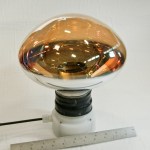Physics
A few lines of dialogue that I wrote today:
"So, the treats I eat represent the matter falling into the black hole, while my poop--"
"You are not coming to my class and pooping to demonstrate Hawking radiation. Don't even think about it."
"I guess that means you don't want to hear my take on the black hole information paradox, then?"
My life is very strange.
I have a whole pile of science-y book reviews on two of my older blogs, here and here. Both of those blogs have now been largely superseded by or merged into this one. So I'm going to be slowly moving the relevant reviews over here. I'll mostly be doing the posts one or two per weekend and I'll occasionally be merging two or more shorter reviews into one post here.
This one is from August 22, 2008 and reviews the following books:
Wrinkles in Time: Witness to the Birth of the Universe
Pursuit of Genius: Flexner, Einstein, and the Early Faculty at the Institute for Advanced Study
Archimedes…
"If I have ever made any valuable discoveries, it has been due more to patient attention, than to any other talent." -Isaac Newton
Born the year Galileo died, Isaac Newton is one of the most revered figures in all of physics.
In addition to the work he did on optics, planetary motion and gravitation, Newton is also famous for his three laws of motion, which -- even today -- apply very well to every particle in the Universe. They are:
Law #1: An object at rest will remain at rest, and an object in motion will remain in motion, unless acted upon by an outside force.
What does this mean? It…
My talk at the AAAS meeting was part of a symposium on the results from the 2008 Trends in International Math and Science Survey (TIMSS) Advanced. This is an international test on math and physics given to high-school students in nine different countries (Armenia, Iran, Italy, Lebanon, Netherlands, Norway, Russia, Slovenia, Sweden), and this is part of an ongoing survey, with a previous round given in 1995 or 1998. As part of the preparation for the talk, I got all the released items from TIMSS 2008, including score breakdowns and demographic information. My own analysis of this was fairly…
"Leading scientists are warning that a massive solar storm could trigger a $2 trillion 'global Katrina' that short-circuits power grids worldwide." -Lesley Taylor
If you've been keeping up with your online news lately, you may have heard that, undoubtedly, an impending Solar Storm will cause hundreds of billions -- if not trillions -- of dollars of damage.
The impending storm has been compared to a global Hurricane Katrina. What's the hullaballoo about?
Last week, the Sun launched forth a powerful Solar Flare, as imaged above by NASA's Solar Dynamics Observatory. What was the big effect of…
My talk yesterday at AAAS went well, if too long (the person who was supposed to be flagging the time got distracted, and never gave me any indicators that I was going on, and on, and on... But that's not really what I want to post about. The thing that triggered this is the speaker giveaway from AAAS, which is a combination laser pointer and 1GB USB drive.
"Big deal," you say. Those are cheap." And, yeah, they are, but when you think about it, that's really kind of amazing.
50 years ago, the laser had barely been invented, and was still in search of a problem. Nobody had yet had the idea…
"I'll do my dreaming with my eyes wide open, and I'll do my looking back with my eyes closed." -Tony Arata
Would you believe me if I told you that -- in terms of your own eyes -- you saw better at night than you did during the day?
It's true! But it doesn't have much to do with the amount of light available. When you're looking out at distant objects, you'd love to be able to resolve them with your eyes.
For example, that object in the distance, down the road in the image above? Is it a motorcycle with one headlight, a car or truck with two, or (I hope not!) a train with three?
Well, with…
We had an education talk yesterday afternoon, because today's colloquium speaker, Ann Martin from Cornell, has strong interests in that and wanted to talk to people about it. A lot of the discussion had to do with teaching students to write, and getting them to accept feedback. Martin spoke very positively of a writing-intensive introductory course she did about cosmology, and said she saw significant improvement in both students' understanding of key concepts and the quality of their written work over the semester.
Those of us who teach a lot of introductory physics classes with labs all…
Sean Carroll and Brad DeLong have each recently asserted that relativity is easier to understand than quantum mechanics. Both quote Feynman saying that nobody understands quantum mechanics, but Sean gives more detail:
"Hardness" is not a property that inheres in a theory itself; it's a statement about the relationship between the theory and the human beings trying to understand it. Quantum mechanics and relativity both seem hard because they feature phenomena that are outside the everyday understanding we grow up with. But for relativity, it's really just a matter of re-arranging the concepts…
Doug Natelson talks about a recent presentation on education:
I recently heard a talk where a well reputed science educator (not naming names) argued that those of us teaching undergraduates need to adapt to the learning habits of "millennials". That is, these are a group of people who have literally grown up with google (a thought that makes me feel very old, since I went to grad school w/ Sergei Brin) - they are used to having knowledge (in the form of facts) at their fingertips in a fraction of a second.
I can certainly agree about the Google part-- having graded a bunch of preliminary…
As I've mentioned in passing before, I'll be attending the Annual Meeting of the American Association for the Advancement of Science next weekend, in order to appear on a panel about the TIMSS Advanced 2008 test. I'm an idiot, and didn't submit an abstract in time (I thought there was a perfectly adequate placeholder abstract there, but I must've imagined it), but I'll be talking about how the physics questions on the test line up with standard curricula and conceptual tests and that sort of thing. The three-hour symposium format is not what I'm used to (presentations at physics meetings are…
Mr. Harley: Your impatience is quite understandable.
Klaatu: I'm impatient with stupidity. My people have learned to live without it.
Mr. Harley: I'm afraid my people haven't. I'm very sorry... I wish it were otherwise.
-The Day The Earth Stood Still, 1951
People love to talk about the constancy of the natural phenomena. Every 24 hours, from anywhere not within either the Arctic or Antarctic circles, for instance, there's one sunrise and one sunset.
Image credit: Danilo Pivato.
And, of course, there are two high tides and two low tides every day.
The Earth rotates on its axis, and revolves…
Barring a major disaster, I am scheduled to teach one of our Scholars Research Seminar classes next winter. I've been kicking the idea for this around for a while, with the semi-clever title "A Brief History of Timekeeping." The idea is to talk about the different technologies people have used to mark the passage of time, from Stonehenge down to modern atomic clocks. There's a lot of good science in there, from astronomy (sundials and the like) to basic mechanics (pendulums and so on) to quantum physics (atomic clocks) and even relativity. And there's plenty of room for side trips into other…
I haven't been as relentless about flogging How to Teach Physics to Your Dog (now available in paperback!) as I was last year, because it gets kind of exhausting. I do have a vanity search set up on Google Reader that points me to the occasional review-- this one, for example, so I still see the occasional positive comment, which is good for a boost in a difficult week at work.
Of course, the vanity search is world wide, which means it also picks up mentions of the international editions, such as this Italian blog (oddly, it gets my employer wrong-- I should check the Italian edition and see…
How do scientists make glass stronger? Break it.
Brookhaven Lab physicists and engineers take this hands-on approach a step further. In order to strengthen the design of glass bulbs known as photomultiplier tubes, the researchers submerge the devices in 500,000 gallons of pressurized water, punch a small hole through their sides, and watch as the glass cracks, crunches, and, just milliseconds later, implodes (see videos below).
The implosion of a photomultiplier tube in a tank at BNL, as seen through combined high-speed camera images. Time scale: 6,000 frames per second.
Fifty thousand…
The "peer reviewers get worse" item in this morning's Links Dump drew an immediate comment elsewhere to the effect of "of course they do, because they start pawning reviews off on their students. This one was a surprise to me, so here's a quick poll to see if my subfield of physics is really that much more collegial and ethical than the rest of science:
Handing a referee report for a grant or paper off to be written by a grad student or post-doc is:customer surveys
Refereeing takes place via classical communications channels, so you may only choose one option.
My experience is that while I…
"How'd the moon get here? Look, you pinheads who attacked me for this, you guys are just desperate. How'd the moon get here? How'd the sun get there? How'd it get there? Can you explain that to me? How come we have that and Mars doesn't have it?" -Bill O'Reilly
Once upon a time, humans looked at the tides -- going out and coming in -- and we had no idea what caused them. At high tides, the sea level would rise, and the coast would get swept up by the oceans, while at low tides, the water would recede, leaving tidepools behind.
Image credit: smugmug.com.
Low tides and high tides would each…
I make an effort to say nice things about pop-science books that I read, whether for book research or blog reviews. Every now and then, though, I hit a book that has enough problems that I have a hard time taking anything positive from it.
I got David Bodanis's E=mc2: A Biography of the World's Most Famous Equation from Union's library because I like the subtitle, and plan to reference it in the relevant chapter of the book-in-progress. I figured that, if I'm going to swipe his subtitle, I should at least be able to say something substantive about the book.
Bodanis takes pains to say that…
"One creates from nothing. If you try to create from something you're just changing something. So in order to create something you first have to be able to create nothing." -Werner Erhard
One of the oldest adages in existence is you can't get something for nothing, as over a million websites will tell you, including not-so-subtly, cartoonstock.
And, most often when people bring this up to me, it's in an attempt to prove the existence of God -- and the insufficiency of the Big Bang -- by pointing to the Universe.
Image credit: chaospet.
Well, let's take this question as seriously as our…
"It's the great mystery of human life that old grief passes gradually into quiet, tender joy. The mild serenity of age takes the place of the riotous blood of youth. I bless the rising sun each day, and, as before, my heart sings to meet it, but now I love even more its setting, its long slanting rays and the soft, tender, gentle memories that come with them..." -Fyodor Dostoevsky, The Brothers Karamazov
Just last week, I wrote to you about one of the deepest images of the distant Universe, the Hubble Ultra Deep Field.
Image credit: Hubble Ultra Deep Field.
And in particular, how we're able…







